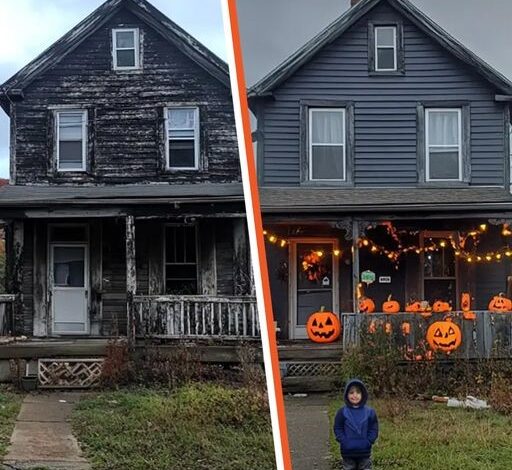
Halloween was his favorite day of the year—a day when you could become anyone you wanted, and the world transformed into something magical.
As Kevin wandered down the street, he admired the glowing decorations and spooky scenes set up in each yard. Witches cackled, doors creaked, and the sounds of Halloween filled the air. But one house stood out, not because it was spooky, but because it was completely dark. No pumpkins, no cobwebs—nothing. It was Mrs. Kimbly’s house.
Mrs. Kimbly was the quiet, older woman who lived alone. Kevin had mowed her lawn in the summer and shoveled her driveway in the winter, but she rarely said much beyond handing him his payment. Now, her undecorated house seemed out of place in the festive neighborhood.
Why hadn’t Mrs. Kimbly decorated for Halloween? Kevin couldn’t shake the feeling that something wasn’t right. Halloween was supposed to be fun, and he didn’t think anyone—especially someone living alone—should miss out.
Determined to help, Kevin crossed the street to her house. Leaves crunched under his sneakers as he approached her front door. He hesitated for a moment, then knocked. After a long pause, the door creaked open, revealing Mrs. Kimbly. Her face was stern, her eyes narrowed behind thick glasses.
“What do you want, Kevin?” she asked, her voice gruff.
Kevin swallowed nervously. “Hi, Mrs. Kimbly. I noticed your house isn’t decorated for Halloween, and I thought maybe you forgot. I could help, if you’d like.”
Her expression hardened. “I didn’t forget,” she snapped. “I don’t need decorations, and I don’t need your help. Now, go away.” She moved to close the door.
Kevin’s heart sank, but he wasn’t ready to give up. “I could do it for free!” he blurted out. “You wouldn’t have to do anything.”
But Mrs. Kimbly scowled and slammed the door. Kevin stood there, stunned. How could anyone hate Halloween that much? He knew her house would likely become a target for pranks if it stayed undecorated, and he didn’t want that to happen.
As Kevin walked home, an idea began to form. He wasn’t ready to give up on Mrs. Kimbly just yet.
At home, Kevin found his mom stirring a pot of soup in the kitchen. “Mom, something strange happened,” he said, sitting down at the table. He explained about Mrs. Kimbly’s dark house and how she had slammed the door in his face.
But when he mentioned Mrs. Kimbly’s name, his mom’s expression softened. “Maybe you should leave her alone,” she suggested gently. “People sometimes have reasons for doing things we don’t understand.”
Kevin frowned. “But, Mom, I think she’s not mad—I think she’s sad. Halloween is supposed to be fun, and I don’t want anyone to feel left out.”
His mom smiled softly. “You have a big heart, Kevin. Just remember, some people aren’t ready for help, even if they need it.”
Her words lingered in his mind, but Kevin still felt like Mrs. Kimbly was just lonely. He was determined to make her Halloween special.
The next day, Kevin gathered every decoration he could find—twinkling lights, plastic spiders, and his favorite carved pumpkin. It was special to him, but if it could make Mrs. Kimbly smile, he was willing to part with it.
He loaded everything into a wagon and headed back to her house. Kevin worked quickly, hanging lights and placing pumpkins on her porch. The house was starting to come alive with Halloween spirit. Just as he finished arranging the last pumpkin, the door flew open.
“What do you think you’re doing?” Mrs. Kimbly stormed out, her face red with anger. “I told you not to decorate my house!”
Kevin froze, his heart pounding. “I just wanted to help,” he said softly. “It’s Halloween…”
Before he could say more, Mrs. Kimbly grabbed the nearest pumpkin—the one Kevin had spent hours carving—and smashed it on the ground. It shattered into pieces across the porch.
Kevin blinked back tears as he stared at the ruined pumpkin. He had worked so hard on it, and now it was gone. Without a word, he turned and ran home.
That night, dressed in his vampire costume, Kevin couldn’t enjoy Halloween. As he wandered from house to house with his friends, collecting candy, his thoughts kept returning to Mrs. Kimbly’s dark house. He knew the other kids might target her home for pranks, and he didn’t want that to happen.
Determined to stop any trouble, Kevin made his way back to her house. He sat on her porch, handing out candy from his own bag to passing trick-or-treaters, explaining, “Mrs. Kimbly’s not home.” He wasn’t sure how long he had been sitting there when the front door opened.
Startled, Kevin looked up to see Mrs. Kimbly standing in the doorway. Her face wasn’t angry anymore. “What are you doing here, Kevin?” she asked softly.
“I didn’t want anyone to mess with your house,” he explained. “I thought maybe I could help.”
Mrs. Kimbly sighed and sat down beside him. “I’m sorry for earlier,” she said quietly. “Halloween is hard for me. I don’t have any family, and seeing everyone else celebrate just makes me feel… alone.”
Kevin’s heart ached. “You don’t have to be alone,” he said. “You can celebrate with us. We’d love to have you join in.”
A small smile crept across Mrs. Kimbly’s face. “You’re a kind boy, Kevin. Thank you for what you did. And I’m sorry about your pumpkin.”
“It’s okay,” Kevin said, smiling back. “I have another one at home. We can carve it together if you want.”
Mrs. Kimbly chuckled softly. As Kevin ran home to grab the pumpkin, Mrs. Kimbly felt something she hadn’t felt in years—the warmth of Halloween spirit, all thanks to a boy who refused to give up.
What do you think of this story? Share it with your friends—it might brighten their day too.
11 Old-School Parenting Rules That We Can’t Imagine to Follow Today
These days, young parents have tons of information about raising kids. There are books, websites, and experts offering advice on every little thing. They can even get consultations from specialists whenever they need. But our own parents didn’t have all that. They raised us based on what they knew and what they learned from their own parents. So sometimes, the way we were brought up can seem really different from what we’re told is best now.
1. Early marriage and parenthood go without saying.
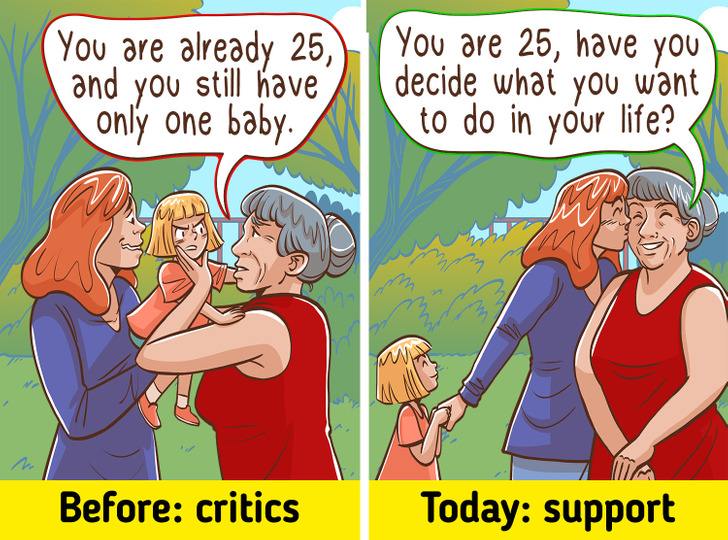
In earlier generations, there was often pressure on young adults to marry and start a family at a relatively young age, and to have more than one child a couple of years after the start of the family. Today, there is more emphasis on personal and career development before settling down. And moreover some researches show that early marriage can lead to some family problems, like dissatisfaction with married life, experience of having lots of responsibility, lack of independence in family life.
2. A college education is an indicator of your status.

«You can’t find a good job without going to college!» Many people must have heard this when they were teenagers. And lots of us believed this, but now don’t even know where our college diploma is. More than 41% of people that finished college have jobs that don’t require this kind of education. Today, employers are more interested in the practical skills of their employees rather than their qualifications.
When you finish school, it may be wise to take a gap year to understand what you really want to do and decide if you actually need a college education.
3. Classes are good for kids’ development — the more, the better!

A very tight schedule can exhaust children, which is obviously not good at all.
Famous American teacher Douglas Haddad recommends that parents slow down and give their children time to discover their own talents, and then decide if they need additional forms of education.
4. Being plump is healthy.
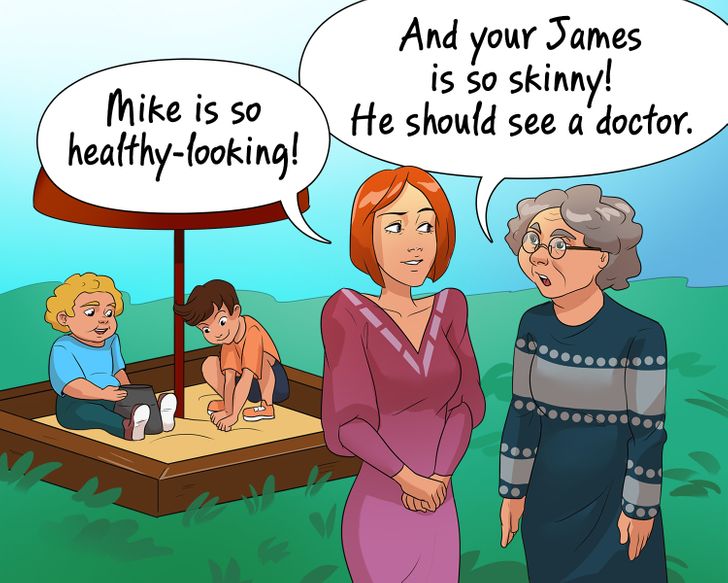
Children that always finished their meals were praised, and being plump was believed to be healthy. But bad eating habits formed in childhood often result in weight problems and eating disorders.
5. Money can’t buy happiness.
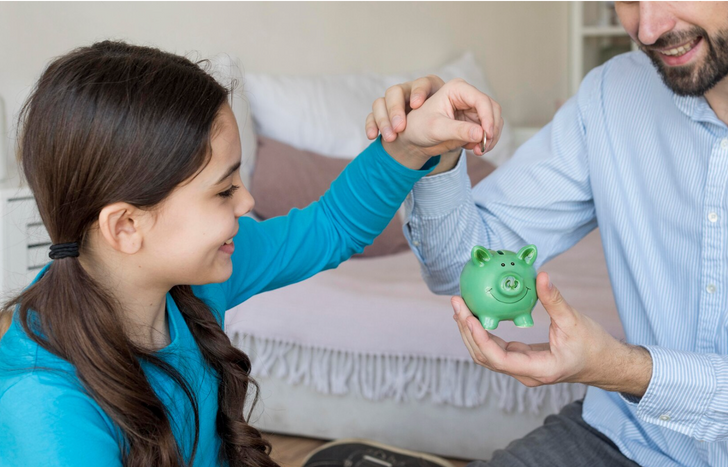
We wish this were true, but life says otherwise: money can make you happier, no matter what other people say.
Parents should teach their children the basics of budgeting. This will help kids form the right habits in money management and reach financial success in their adult lives.
6. Not standing out from the crowd means being good.
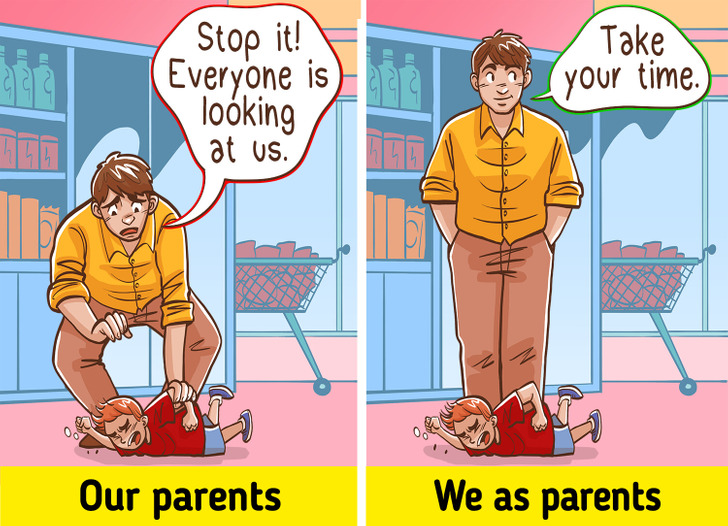
Traditional parenting often enforced strict dress codes and grooming expectations, particularly regarding modesty and conformity to societal norms. This might puzzle us today as modern parenting encourages children to express themselves through their clothing, appearance and let them express their emotions fully.
7. Older children are responsible for younger ones.
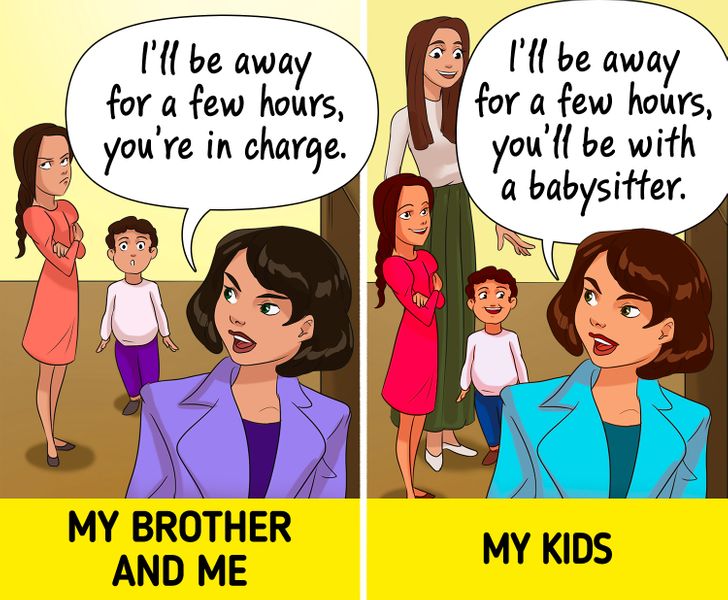
Very often, older children had to spend a lot of time taking care of younger ones. Parents had to work a lot and there was no other choice. But older kids had to sacrifice their time with friends and hobbies for the needs of their younger siblings.
Psychologists say that sometimes when kids have to perform the duties of parents, it may lead to psychological problems: they might not want to have their own children.
8. Women are housewives and men are breadwinners.

In recent decades, gender roles are not as important anymore. Women today can build successful careers and men can go on paternity leave and manage things around the house.
9. There’s nothing more shameful for a woman than having children without a husband.
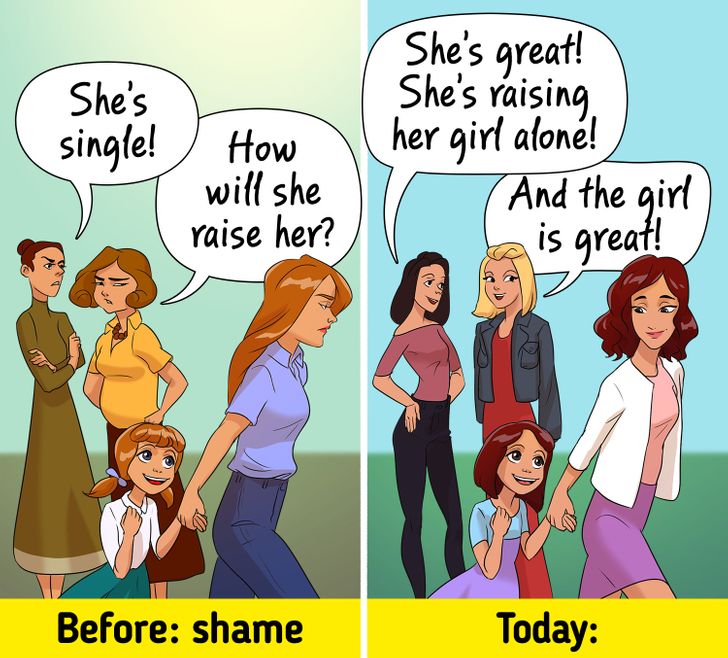
Wrong, again. Today, there’s nothing surprising about single mothers and they’re not frowned upon as they were 30 years ago. Very often, having a child without a husband is an informed decision made by a woman. More than that, in the past 30 years, the number of single fathers has increased 1.5 times.
10. Storks deliver babies.
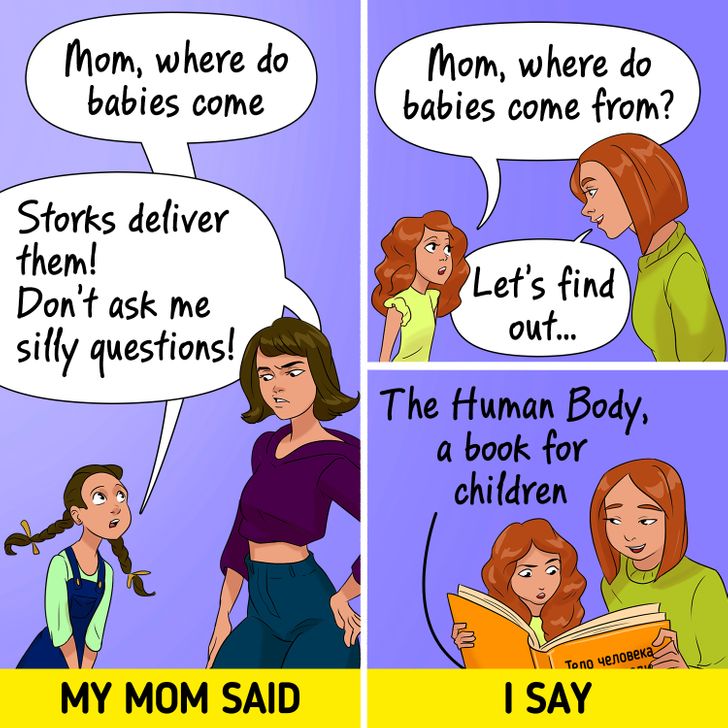
Some topics were never discussed — like when kids asked where babies came from, parents often said that they were delivered by a stork. Because of this, young people would often get into their first relationship without any knowledge of their bodies. They only based things off of the advice they received from their friends and bits of information from books and films. All these experiences could lead to bad consequences, including problems with both physical and mental health.
11. Children should be seen and not heard.

In the past, children were often expected to remain quiet and obedient in the presence of adults. Modern parenting emphasizes the importance of children expressing themselves and their opinions, because self-expression is a vital component of a young individual’s growth. The development of self-esteem and confidence in children is frequently nurtured by their capacity to express their feelings with clarity and authenticity.
Every parent has their own way of raising children. Just like how every family has its own special traditions, parents have rules they think are best for their kids. Sometimes, famous people, like celebrities, also share their ideas about parenting. They might talk about what works for them and their families. But in the end, each parent decides what’s right for their own children, based on love and what they believe is best.



Leave a Reply